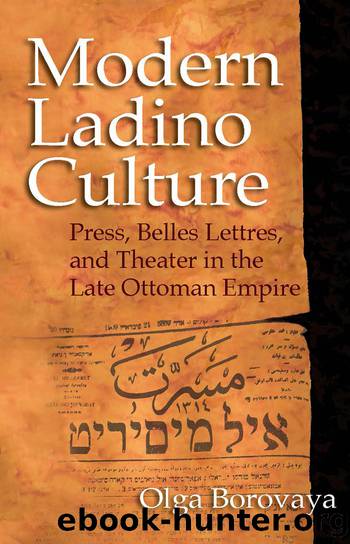Modern Ladino Culture by Borovaya Olga;Borovaya Olga;

Author:Borovaya, Olga;Borovaya, Olga;
Language: eng
Format: epub
Publisher: Indiana University Press
Readers of Ladino Serialized Novels
In her elucidating essay on the Yiddish-reading public in Eastern Europe, Alyssa Quint challenges the generally accepted notion of two stages in the development of modern Yiddish literature and suggests that in reality it had two discrete beginnings.22 The first one initiated âhighbrowâ Yiddish literature, which was generated throughout the first three-quarters of the nineteenth century. The second, beginning in the early 1880s, marked the rapid growth of the âlowbrowâ modern Yiddish book industry.23 Based on this assumption, she posits the existence of two different audiences and argues that many maskilim wrote for themselves and their educated contemporaries, even if some of them claimed they wanted to be useful to the masses.24
In the Sephardi community, the situation was drastically different. While in the first three decades of the Ladino press Sephardi journalists targeted a small audience consisting of somewhat educated male readers, in the 1870s they began to address a mass audience of both sexes. At any given time, there was only one Ladino-reading public, which was offered one set of secular texts. As I demonstrated, the gradual transformation of the Ladino press came with the expansion of the audience, which now included the intended male readers of the earlier periodicals as well as illiterate women.
As an author of mass fiction par excellence, Carmona emphasized that it was the new readers, previously not exposed to mass secular literature, who brought him his first financial success: âHaving noticed that those who read in Spanish [Ladino] are those who know neither Turkish nor French, I started writing in the popular language understood even by children and old women, and that way my little stories began to have true success.â25
Carmonaâs characterization of his readership should be understood in the sense that, for commercial purposes, he had to make sure that even the least educated readers would be able to follow his stories. His statement certainly cannot be taken literally,26 if only because very few Sephardi Jewsâ and only menâwere able to read Turkish. On the other hand, among the readers of Ladino fiction there were many people fluent in French, simply because educated Sephardim also read Ladino periodicals and thus would have seen the stories published there. Even El Luzero depended on the sales of serialized Ladino novels, though the majority of its readers would have known French. Thus, the claim that Ladino belles lettres was produced for uneducated Sephardim does not imply that Sephardim who were literate in French did not read it but, rather, that it was primarily intended for those who did not know any other language.
As for children being the intended or at least potential readers of Ladino fiction, this question has not been dealt with so far, but there is no evidence showing that Sephardi literati produced anything specifically for children. Nevertheless, in the next chapter, I will argue that Benghiatâs version of Gulliverâs Travels was intended for children no less than for adults. It is possible that Sephardi westernizers did not really target
Download
This site does not store any files on its server. We only index and link to content provided by other sites. Please contact the content providers to delete copyright contents if any and email us, we'll remove relevant links or contents immediately.
| African | Asian |
| Australian & Oceanian | Canadian |
| Caribbean & Latin American | European |
| Jewish | Middle Eastern |
| Russian | United States |
4 3 2 1: A Novel by Paul Auster(11786)
The handmaid's tale by Margaret Atwood(7445)
Giovanni's Room by James Baldwin(6806)
Asking the Right Questions: A Guide to Critical Thinking by M. Neil Browne & Stuart M. Keeley(5355)
Big Magic: Creative Living Beyond Fear by Elizabeth Gilbert(5349)
Ego Is the Enemy by Ryan Holiday(4950)
On Writing A Memoir of the Craft by Stephen King(4658)
The Body: A Guide for Occupants by Bill Bryson(4578)
Ken Follett - World without end by Ken Follett(4441)
Bluets by Maggie Nelson(4258)
Adulting by Kelly Williams Brown(4230)
Eat That Frog! by Brian Tracy(4147)
Guilty Pleasures by Laurell K Hamilton(4114)
White Noise - A Novel by Don DeLillo(3828)
The Poetry of Pablo Neruda by Pablo Neruda(3813)
Fingerprints of the Gods by Graham Hancock(3731)
Alive: The Story of the Andes Survivors by Piers Paul Read(3725)
The Book of Joy by Dalai Lama(3692)
The Bookshop by Penelope Fitzgerald(3615)
